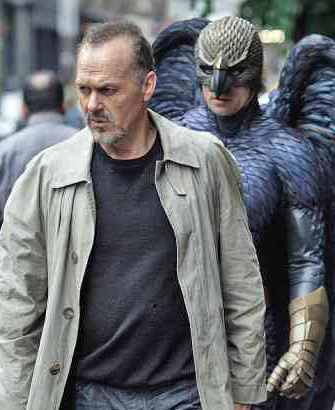Best Picture winner is a heady cinematic trip
The Oscars’ best picture winner, “Birdman,” is finally showing in town, so film buffs should try to catch it—before it flies away!
It may not be the best of the best in our book, but Alejandro Iñarritu’s film is a heady cinematic trip, a consciousness-expanding excursion into the rarefied realm where consciousness and the unconscious powerfully collide—then fuse.
The film’s protagonist is a popular film star (Michael Keaton) who yearns for artistic cachet and recognition, and produces, scripts, directs and stars in a Broadway play to attain his lifelong dream.
Alas, his fervent desire for artistic “legitimacy” turns out to be most elusive, as his production is fraught with many problems before it officially opens.
Instead of losing heart, however, Keaton’s character, Riggan Thomson, listens to a loud and mysterious “voice” in his head that is later revealed to be his past superhero screen persona, Birdman, which has so completely taken his subconscious over that he can levitate and move objects around with seeming ease and impunity.
It’s even suggested early on that Thomson is able to get rid of an unwanted actor by “sending” a heavy object from above to hit him on his untalented noggin!
In less able directorial hands, these serial shifts between reality and wish fulfillment could have ended up running away with the film, but Iñarritu is able to focus on other factors related to his protagonist’s family life that explain why he’s so sad, empty and prone to escaping into freaky fantasy. In particular, he’s guilt-ridden over his having been an absent dad to his now grown-up daughter (Emma Stone).
As his troubled production lurches toward its official opening, other characters join the cast, not just of Thomson’s play, but also of his life.
Most memorable of them all is an ace actor played by Edward Norton, who with his huge talent and ego ends up subverting Thomson’s dream of glory—by stealing his thunder and calling attention to himself!
What’s Thomson to do? The voice in his head takes over, and later even manifests itself as a physical presence that pushes him to not just literally fly, but to also come to an attention-grabbing decision—that puts his life at risk.
While all of this is going on, the film shifts from reality to fantasy and back again with increasing heat and hysteria, until we realize that the outcome of the story is out of the hands of its addled and frazzled protagonist—who has become his own antagonist, at the same time!
Aside from Keaton, whose completely committed performance gets into Thomson’s very heart and soul, the best portrayals here are turned in by Stone and Norton. Even as Keaton holds the film’s center, they come up with similarly “dangerous” performances that make the film the year’s best example of superlative ensemble thespic work.
Beyond its actors’ exemplary performances, “Birdman” has other thematic riches to share, like the corrosive and numbing effects of stellar success, the dirge and dredge of artistic failure, and what love is really all about.
The ways that its high-flying maker has conjured up to share them may be occasionally “extreme,” but its fruits are movingly accessible, and cut to the heart of the matter—and the matter of the heart!
